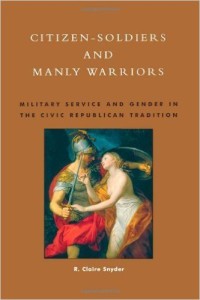In honor of Veterans Day, I thought I would revisit my work on the citizen-soldier tradition that began with my book Citizen-Soldiers and Manly Warriors (1999).
Unlike a lot of countries, the U.S. is not governed by a military dictatorship. Instead we embrace a vision that combines democratic self-government with a citizen military under civilian control — based on the historic tradition of the citizen-soldier.
 In its ideal form, the citizen-soldier tradition presents a rich vision of democracy, in which both popular sovereignty and the rule of law are fundamental principles. In order to protect liberty, citizens participate in governing themselves for the common good through the rule of law and pick up arms only to defend their ability to do so.
In its ideal form, the citizen-soldier tradition presents a rich vision of democracy, in which both popular sovereignty and the rule of law are fundamental principles. In order to protect liberty, citizens participate in governing themselves for the common good through the rule of law and pick up arms only to defend their ability to do so.
By linking military service to participatory democracy, the tradition maintains that the decision to wage war should be decided by those who will actually have to fight. This strong conception of self-government does not reduce democracy to elections, nor does it accept the decisions of unaccountable elites as legitimate.
The tradition faces this paradox head-on: A democratic society needs a military for protection, yet the military itself potentially poses a threat to democratic society because armed forces could seize control of government, as happens in other countries. While part of the solution to this conundrum includes civilian control over the military (POTUS!), the citizen-soldier tradition emphasizes a variety of other safeguards as well.
The citizen-soldier tradition maintains that all citizens must share responsibility for military service for three reasons.
- A military comprised of temporary citizen-soldiers helps prevent the emergence of a distinct warrior class that could impose tyranny.
- It assumes that ordinary citizens generally don’t like to serve and so will only wage war when absolutely necessary.
- It is unfair and antidemocratic to expect only the economically disadvantaged to risk their lives for the protection of society — the so-called “economic draft.”
Shared responsibility helps protect the people from both elite power and elite irresponsibility.
While this tension can never be eliminated, the citizen-soldier tradition seeks to contain the threat of militarism within a set of democratic parameters. As a normative philosophy of the military, the citizen-soldier tradition justifies military force primarily to defend democracy from those forces that would undermine its fragile ideals of civic equality, popular sovereignty, and the rule of law.
While actual citizen-soldiers have engaged in wars of conquest against other peoples, militaristic conquest per se was not the justification for the linkage between citizenship and soldiering within the civic republican tradition.
To the contrary, the citizen-soldier tradition actually seeks to contain the forces of militarism within democratic bounds by requiring all citizens to share responsibility for the military temporarily, rather than relying on professional warriors whose careers depend upon waging war. Thus, militarism is not the goal of the citizen-soldier tradition, but rather the problem it seeks to control.
In its essence, the citizen-soldier tradition strives to create a military that does not have an interest in prolonging war or advancing the interests of illegitimate rulers. In the sixteenth century, the primary threat was hired mercenaries who depended on war for their livelihoods. In the eighteenth century, it was the existence of a standing army that could help maintain the illegitimate power of the King or the President.
Today, I would argue, a new threat exists: civilian elites who espouse militarism in order to advance their own economic interests and political power – profiting the military-industrial complex, justifying male dominance, and maintaining the power of politicians, most of whom do not have the legitimacy that comes from being elected by the majority of the people — with little regard for the costs incurred by our men and women in uniform.
If we are going to put our people in harm’s way, there better be a good reason, and it’s the People themselves who should make that decision, not politicians with nothing at stake.